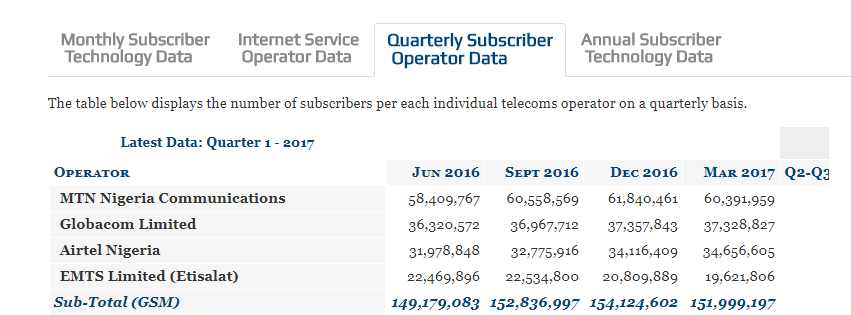
I have written extensively on Etisalat Nigeria. My point remains that Etisalat Nigeria’s root problem is not really foreign currency related (partly it is). Many are making a case that the firm took loans in USD and when Naira crashed, it could not service a foreign currency-denominated loan with Naira. Hence the challenges it is facing now.
They are partly correct. However, in my opinion, the real cause of Etisalat Nigeria problem is customer retention. This is the root cause and I will explain with hard data which does not lie.
This Root Cause
Please refer to NCC (Nigerian Communications Commission) data here which is reproduced in the table below.
Register for Tekedia Mini-MBA edition 19 (Feb 9 – May 2, 2026): big discounts for early bird.
Tekedia AI in Business Masterclass opens registrations.
Join Tekedia Capital Syndicate and co-invest in great global startups.
Register for Tekedia AI Lab: From Technical Design to Deployment (next edition begins Jan 24 2026).

These are the key takeaways:
- Etisalat NG lost about 2 million users in Q4 2016 (Dec 2016). For a #4 operator to lose that number of customers means it is going to struggle. This has nothing to do with any loan in dollars or Naira. All other operators gained from it including MTN, Glo and Airtel (i.e. between Sept 2016 and Dec 2016, they added more users in their networks)
- In Q1 2017 (Mar 2017), it lost about another 1 million. Etisalat lost nearly the same number of users as MTN, but MTN is about 3x its size. So Etisalat lost most, technically. Airtel gained users while Glo lost just a few (about 30,000)
- Had Etisalat NG kept the 2 million it lost in Q4 2016 and each of those subscribers spending N2,000 during the period, on average, it would have earned N4 billion naira extra in revenue.
- Also, had Etisalat NG kept the 1 million it lost in Q1 2017, it would have added extra revenue of N2 billion using the same average spending of N2,000 per user. Please carry forward the N4 billion owing to the lost of 2 million users in Q4 2016. With that, Etisalat would have earned extra N6 billion in Q1 2017 on top of whatever it earned.
- Add these two extra revenues of Q4 2016 and Q1 2017, Etisalat would have made extra N10 billion (~$30 million). This would have kept it in a good position to be servicing its debt.
Why Banks Took Action
I do not have the insider information. But looking at the data from NCC, banks could have decided that Etisalat was on a slippery road with the users it was losing. The problem was not that it could not pay the loan. The problem was that it was losing users. As #4, that was fatal.
Had Etisalat been holding up with its user base or better adding users, banks would have given it time to sort itself. But where it had these fatal flaws in numbers, they had no option before the problem deepened.
You can be an orator, but numbers are numbers. In business, that makes everyone a better presenter. Etisalat NG did not have good numbers in Q4 2016 and Q1 2017.
Why the UAE Parent Firm Pulled Out
This is still the same reason. They do not see how Etisalat NG could grow. So instead of bailing out the firm, they decided to cut their losses. If Etisalat problem was paying the remaining balance of the loan, rumored to be about $600 million, without the loss of customer base, they could have helped,
This assertion is supported by the fact that Etisalat Management wanted money to invest in growth. They got it via the loans. So what again will you do? You have given them money and the result is customer exodus? There is no better strategy than to abandon the firm. Then wait for it to fail so that assets are sold to recover whatever is possible. (Please do not make this personal. I am just reporting facts here and business.)
Rounding Up
The fact is that there is no better reason for a firm with the best customer service, according to NCC and generally customers, will be losing the most customers, other than that its pricing is high. That is why I have maintained this position and will continue to do so until we see new data to change our narrative, And the customer exodus triggered by that high pricing resulted to the massive loss of revenue which precipitated in the inability to keep servicing the debt.
---
Connect via my
LinkedIn |
Facebook |
X |
TikTok |
Instagram |
YouTube



